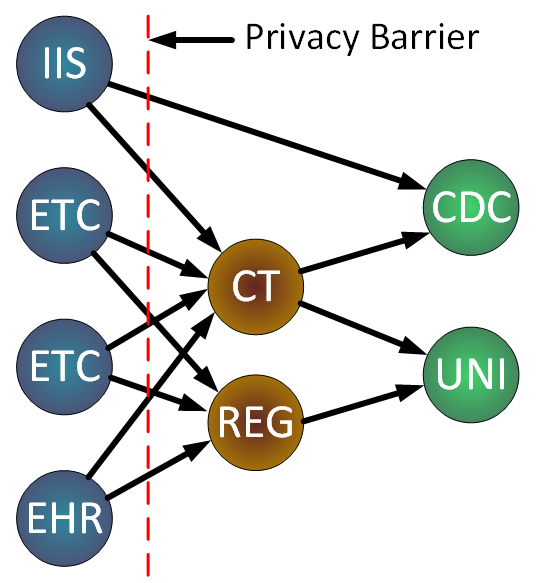Difference between revisions of "Federated Learning"
From MgmtWiki
(→Privacy Enhancing) |
|||
| Line 26: | Line 26: | ||
==Privacy Enhancing== | ==Privacy Enhancing== | ||
| + | * An [https://ktn-uk.org/wp-content/uploads/2022/08/PETs-Prize-Challenges_-Public-Health-Technical-Brief-1.pdfinitiative of the US and UK governments] Pandemic Response and Forecasting is focused on Transforming Pandemic Response and Forecasting through Federated Learning with End-to-End Privacy. | ||
* To make the graph privacy-enhancing we demand that any personally identifiable information (PII) is restricted to the leaves meaning that it never is processed anywhere but within the medical facility where it is already maintained with full personal data. Only the learning from the data is passed up to the aggregator. | * To make the graph privacy-enhancing we demand that any personally identifiable information (PII) is restricted to the leaves meaning that it never is processed anywhere but within the medical facility where it is already maintained with full personal data. Only the learning from the data is passed up to the aggregator. | ||
* The question to be determine is where this privacy guarantee will adversely impact the accuracy of the learning process. The test matrix proposed here will address that. | * The question to be determine is where this privacy guarantee will adversely impact the accuracy of the learning process. The test matrix proposed here will address that. | ||
Revision as of 10:30, 5 September 2022
Contents
Full Title
A means of learning where the nodes can operate independently to create a common understanding of a problem.
Goals
- Accuracy in predicting when a pandemic is likely to occur. But false positives are less problematic than false negatives.
- Universality - in predicting all types of pandemic
- Reproductivity - in the face of growing skepticism in the results of AI.[1]
- Adaptability - in the face of constant advances in knowledge of AI.
Context
- Most human learning is federated in the sense that each human operates as an independent entity which receives inputs and creates outputs.
- In this pattern we model the human tendency to spread processing to each node with a similar hierarchy of capability and sophistication among the nodes.
- This pattern also mimics the Edge Computing pattern of 5G that focuses computing and data gathering to the edge nodes.
A Hierarchical Directed Graph
One solution is to create a network of all nodes that run any learning algorithm into a multiplicity of trees with paths that always move towards the root of each tree and away from the leaves as well as paths that go from the root out to the leaves to pass new requirement into the leaves.
- IIS = Immunization Information Service
- EHR = Electronic Health record
- CT = Clinical Trial
- REG = Regional network
- CDC = Governmental Agency
- UNI = Research Institution
- ETC = other data sources
Privacy Enhancing
- An of the US and UK governments Pandemic Response and Forecasting is focused on Transforming Pandemic Response and Forecasting through Federated Learning with End-to-End Privacy.
- To make the graph privacy-enhancing we demand that any personally identifiable information (PII) is restricted to the leaves meaning that it never is processed anywhere but within the medical facility where it is already maintained with full personal data. Only the learning from the data is passed up to the aggregator.
- The question to be determine is where this privacy guarantee will adversely impact the accuracy of the learning process. The test matrix proposed here will address that.
Key Deliverables
- An interface to the leaf nodes that accepts requests for new learning and passes back learning into multiple aggregators.
- A means to motivate the leaf nodes to participate in in a variety of research goals.
Using Test Data
- The synthetic test data will not likely be distributed as it would be in real life.
- The goal is to determine whether selecting data in a manner that mirrors real life and federating populations that mirror real life will be lost to the results with uniform sorting. The following plan is designed to show the impact of distributing data the way that data is likely to be separated in the real world.
- Break the synthetic data into two groups that are randomly selected from the data and getting a result with a single aggregation of those two sets.
- Break the population into 50 groups with random selection.
- Break the population into 50 groups with deliberately selected groups be overrepresented in each group and of widely different numbers of individuals.
- Aggregate each selection into a test learning.
- Measure the discrepancy between the results in each to see impact of real-world distributions on the federated learning results.
References
- ↑ Will Knight, Sloppy Use of Machine Learning Is Causing a ‘Reproducibility Crisis’ in Science Wired 2022-08-10 https://www.wired.com/story/machine-learning-reproducibility-crisis/
